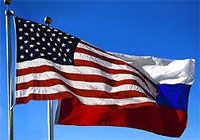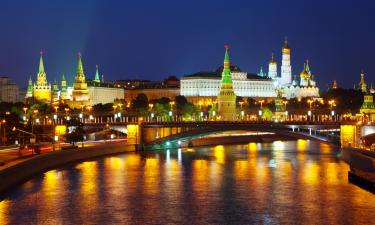Russians Reset Their Attitude To Obama's America
The "reset" in relations between Moscow and Washington is in full swing, and not only at the level of the leadership. According to sociologists, over the past year the percentage of ordinary Russians who began to regard the U.S. favorably has risen quite significantly. Compared to the “cold” fall of 2008, the number of those who welcome the United States has nearly tripled.

According to the data presented on Monday by the All-Russian Public Opinion Research Centre (VTSIOM), the attitude toward the US is warming up. Last year, the proportion of those who feel positive about America has increased from 46 to 59 percent. Residents of small towns and villages feel most positive about the United States (61-63 percent). Residents of Moscow and St. Petersburg most often do not approve of America (36 percent).
The age group representing 18-24-year-olds (64 percent) as well as wealthy respondents (67 percent) approve of the United States. Low income Russians usually do not approve of the US (35 percent).
Russia Today: US lobby war behind Russian spy charges
Among the supporters of political parties, representatives of United Russia feel more positive about the overseas power than others (64 percent). Traditionally, Yabloko members feel "very good" about the States (53 percent). They are followed by the supporters of the Liberal Democrats (52 percent). Proponents of the Communist Party have negative feelings about the US (41 percent).
At the same time social scientists record that the warming in the attitude of Russians towards the United States is becoming a trend. After a burst of negative attitudes toward America in September of 2008, the proportion of those who likes the U.S., has been increasing year after year (46 percent in June of 2009 compared to 59 percent now). During the Georgia-Ossetia conflict, 65 percent of Russians felt negativity about the US.
At the same time, the number of people who do not feel good about the US is getting increasingly smaller (33 percent in 2009 compared to 27 percent this year).
Interestingly enough, in 1991, on the wave of "democratic change," the ratio of those who felt "very good" and "mostly good" about the US was 29 and 54 percent respectively. The h ighest US approval rating recorded was in late 1991, when record 83 percent of Russians expressed the approval of the US.
But the euphoria was gradually declining from year to year along with the realization that the promise of the reform of the so-called "Chicago Boys" (a group of reformers led by Yegor Gaidar) fell through. For example, in December of 1998 only 14 percent of Russians felt “very good” about the United States, while in July of 2003 this number was only five percent.
Since the beginning of Barack Obama’s presidency that marked Washington's abandonment of the policy of direct confrontation with Russia, the attitude of Russians towards the United States has improved significantly, and continues to improve. Incidentally, Obama’s popularity was largely affected by his visit to Moscow in July of 2009.
It is obvious that the bilateral relations, and, consequently, mutual sympathy, will get stronger a few days after a visit of Dmitry Medvedev to the US. The American media reports that the recent meeting between Obama and Medvedev in the White House became the highest point in Russian-American relations since 1995.
Michael McFaul, Obama’s adviser on Russia, said that in the future the two countries will "dig deeper in all aspects." In turn, the deputy national security adviser Ben Rhodes talked about "normalization" of relations on a range of strategic issues
Nevertheless, the culmination of the meeting between Medvedev and Obama was not the signing of important documents, but a joint visit of the two leaders to a traditional American restaurant. Obama and Medvedev took off their jackets, ordered at the counter and then sat down together at a table to eat hamburgers.
Dmitry Medvedev had a burger with onions, peppers, Cheddar cheese, and mushrooms. Obama, as a true lover of the American cuisine, had a hamburger with onions, Cheddar cheese, and lettuce. The presidents split a portion of French fries. Although fast-food is not healthful, unofficial meetings "without ties" prove to make a great impact on improving of relations between people and nations.
Maxim Bogatykh
Pravda.Ru
Subscribe to Pravda.Ru Telegram channel, Facebook, RSS!


